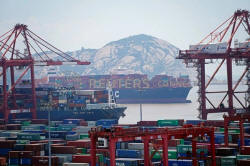China exempts some U.S. goods from retaliatory tariffs as fresh talks
loom
 Send a link to a friend
Send a link to a friend
 [September 11, 2019] By
Yawen Chen and Dominique Patton [September 11, 2019] By
Yawen Chen and Dominique Patton
BEIJING (Reuters) - China announced its
first batch of tariff exemptions for 16 types of U.S. products, days
ahead of a planned meeting between trade negotiators from the two
countries to try and de-escalate their bruising tariff row.
The exemptions will apply to U.S. goods including some anti-cancer drugs
and lubricants, as well as the animal feed ingredients whey and fish
meal, the Ministry of Finance said in a statement on its website on
Wednesday.
Beijing said in May that it would start a waiver program, amid growing
worries over the cost of the protracted trade war on its already slowing
economy.
Some analysts view the move as a friendly gesture but don't see it as a
signal that both sides are readying a deal.
"The exemption could be seen as a gesture of sincerity toward the U.S.
ahead of negotiations in October but is probably more a means of
supporting the economy," ING's Greater China economist Iris Pang wrote
in a note.

"There are still many uncertainties in the coming trade talks. An
exemption list of just 16 items will not change China's stance," she
said.
Indeed, the exempted list pales in comparison to over 5,000 types of
U.S. products that are already subject to China's additional tariffs.
Moreover, major U.S. imports, such as soybeans and pork, are still
subject to hefty additional duties, as China ramped up imports from
Brazil and other supplying countries.
Beijing has said it would work on exempting some U.S. products from
tariffs if they are not easily substituted from elsewhere. The United
States is by far China's largest supplier of whey, which is an important
ingredient in piglet feed and difficult to source in large volumes from
elsewhere.
Analysts have noted that with duties on soybeans and other key imports
such as U.S.-made cars, China is taking aim at a key political support
base of U.S. President Donald Trump, mainly the factories and farms
across the Midwest and South at a time of receding momentum in the
world's top economy.
China has imposed several rounds of duties on U.S. goods in retaliation
against U.S. Section 301 tariffs, beginning last year in July and August
with a 25% levy on about $50 billion of U.S. imports.
In all, the world's two largest economies have slapped tit-for-tat
tariffs on hundreds of billions of dollars worth of goods in a bitter
trade war that has dragged on for well over a year and raised the
specter of a global recession.
The items on the two tariff exemption lists - posted on the ministry's
website - will not be subject to additional duties imposed by China on
U.S. goods "as countermeasures to U.S. Section 301 measures", the
ministry said in its statement.
[to top of second column] |

Containers are seen at the Yangshan Deep Water Port in Shanghai,
China August 6, 2019. REUTERS/Aly Song - RC1D8DFEC0E0

The exemption will take effect on Sept. 17 and be valid for a year through to
Sept. 16, 2020, it said.
ING's Pang noted the United States had also exempted imports of 110 Chinese
products from tariffs in July, including high-value products such as medical
equipment and parts.
TALKS
Wednesday's announcement comes before Chinese trade deputies are expected to
meet with their U.S. counterparts in mid-September in Washington. That will be
followed by highly-anticipated minister-level meetings in early October in the
U.S. capital, involving Chinese Vice Premier Liu He, U.S. Trade Representative
Robert Lighthizer and Treasury Secretary Steven Mnuchin.
For two years, the Trump administration has sought to pressure China to make
sweeping changes to its policies on intellectual property protection, forced
transfers of technology to Chinese firms, industrial subsidies and market
access.
Beijing and Washington were close to a deal last spring but U.S. officials said
China backed away from an agreed text over a reluctance to change laws to
address U.S. complaints.
The South China Morning Post reported https://bit.ly/2manJ5q, citing an
unidentified source, that China was expected to buy more agricultural products
in hopes of a better trade deal with the United States.
But senior White House adviser Peter Navarro tamped down expectations for the
next rounds of trade talks, urging investors, businesses and the public to be
patient about resolving trade dispute.
The Finance Ministry said it will consider more products to be exempted and will
make further announcements "at appropriate times".
Earlier on Wednesday, a survey by a prominent American business association
showed the trade war is souring the profit and investment outlook for U.S.
companies operating in the world's second-biggest economy.

(Reporting by Se Young Lee, Judy Hua, Dominique Patton, Yawen Chen, Huizhong Wu;
Writing by Yawen Chen; Editing by Shri Navaratnam)
[© 2019 Thomson Reuters. All rights
reserved.] Copyright 2019 Reuters. All rights reserved. This material may not be published,
broadcast, rewritten or redistributed.
Thompson Reuters is solely responsible for this content. |